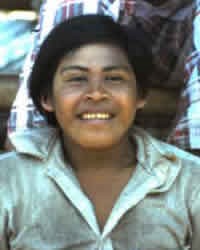The Deni people live in the state of Amazonas, near the western border of Brazil, close to Bolivia. Until 1976, they had very little contact with the outside world because they lived so far from other communities. In 1976, it became easier to reach their area, but the distance still made outside influence hard. The first people to come in contact with them were rubber traders and loggers, and this contact was harmful. The Deni were forced to work for almost nothing, and because they were busy working, they couldn't hunt or take care of their gardens, so many went hungry. This created a lasting mistrust of outsiders.
Men lead Deni society, and they accept polygamy (having more than one wife). Girls usually get married at around 11 or 12 years old, and boys at around 15 to 17. A marriage begins when the bride's father takes down her hammock from his home and hangs it in her husband's house (usually by then, he has his own home). If there is a divorce, which doesn't happen often, it is the man who decides to divorce. He cuts down her hammock from beside his and throws it into the middle of the village.
Women primarily take care of planting crops, while men are responsible for hunting. The Deni people live off their land by fishing, hunting, farming, and gathering fruit. They also use the land to build their homes and boats. Living closely with nature gives them food, medicine, and a healthier life.
For the Deni people, parties are also a form of resistance. In their community, they celebrate for many reasons, such as a good harvest, the birth of a child, a wedding, or when visitors arrive.
The Deni have a pantheistic view of the world, meaning they see gods or spirits in all parts of nature. But they do not believe these gods care about them personally. Their attitude toward the gods is more about fear than love or dedication.
Years ago, Christian missionaries came to live with the Deni to build trust and break down the barriers caused by earlier harmful contact with outsiders. After some time, the Deni realized that the missionaries truly loved them. This made a big impact, and some of them became Christians.
They need better education, healthcare, protection of their land, and people who will approach them with love, just as Jesus did.
Pray that the Deni who are Christians will grow stronger in their faith and be bold in sharing the love of Christ with others.
Ask the Holy Spirit to send people to teach and guide the Deni in faith, and to help break down barriers so the good news can be shared.
Pray that they feel seen and loved by God.
Scripture Prayers for the Deni in Brazil.
https://comin.org.br/exposicoes/povojamamadideni/
https://www.etnomuseudigital.com.br/povo/deni/
| Profile Source: Joshua Project |










